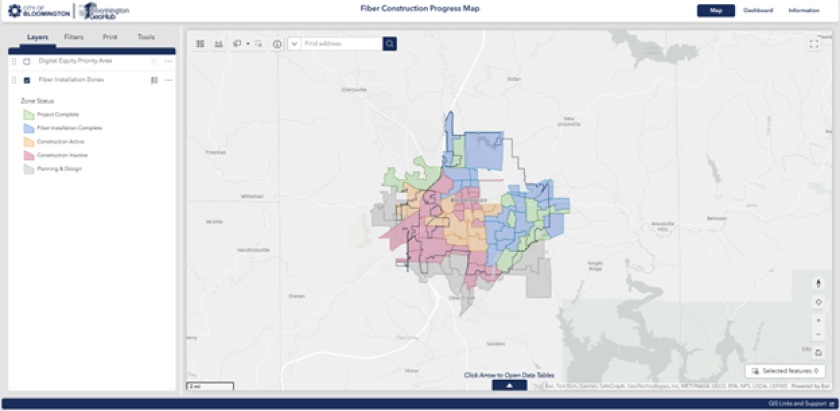- Bloomington Unveils Fiber Map
- Florida City Puts Wi-Fi in Parks
- Connecticut Unveils Broadband Report
- More BEAD Funding Awarded to States
- Libraries Nationwide to Offer Digital Literacy Training
BLOOMINGTON UNVEILS FIBER MAP
The city of Bloomington, Ind., has launched a new interactive map to illustrate progress on one of the city’s largest ever infrastructure construction projects: the Meridiam/Hoosier Fiber Networks build.
The project is currently close to 50 percent complete. Thus far, it has passed over 20,300 units, completed 30 out of 72 project areas, and installed 186 miles of conduit — and is on track to be substantially completed by November.
The Fiber Construction Progress Map, created through a collaboration between the City Engineering Department and the GIS Division of its Information and Technology Services Department (ITS), offers a dashboard displaying construction progress, searchable addresses and planned project timelines. It aims to increase transparency on progress by making information about this project accessible for users.

“The city is thrilled to see the Bloomington Housing Authority provision from our agreement with Meridiam come to life, bringing affordable high-speed fiber Internet service to residents of the Crestmont apartment community,” Rick Dietz, Bloomington’s ITS director, said in a statement.
In a related development, the city is seeking to hire a digital equity specialist to lead initiatives, collaboration and grant administration. Applications for this role will close Tuesday.
Bloomington is also working to update its Digital Equity Survey and Strategic Plan, which will inform and support the city’s work to obtain grants for digital equity.
FLORIDA CITY PUTS WI-FI IN PARKS
In other local news, the city of Homestead, Fla., is launching a new initiative to expand free, high-speed Internet access in the city’s public parks. This initiative is made possible through the City Council’s approval of a resolution.
“This initiative aligns with our commitment to provide essential services that meet the needs of our community and foster growth and opportunity for all,” Homestead Mayor Steve Losner said in a statement.
The Wi-Fi in the Parks initiative will bring free Internet to 11 of the city’s 13 public parks and two community centers — the William F. Dickinson Community Center and the Phichol Williams Community Center — to support increased connectivity and access to digital resources. Installation is expected to begin soon.
CONNECTICUT UNVEILS BROADBAND REPORT
In state news, the Connecticut Department of Energy and Environmental Protection (DEEP) has released its 2024 Connecticut Broadband Report, which evaluates the state’s efforts to expand broadband availability, affordability and adoption in the state. The report is required on a biannual basis, by state legislation.
Highlights of the report include $28 million in grants for Internet access, fewer homes without Internet options, expanded access to gigabit-speed Internet, and lower costs with increased choices.
“We’ve increased basic access to 99.6 percent of Connecticut households and improved adoption to 92.2 percent of homes where broadband is available,” DEEP Commissioner Katie Dykes said in a statement. “We are well on our way to closing the broadband access divide once and for all.”
MORE BEAD FUNDING AWARDED TO STATES
The U.S. Department of Commerce’s National Telecommunications and Information Administration (NTIA) has approved and recommended award applications from a series of new states and territories, allowing them to request access to funding to implement their digital equity plans.
As of Thursday morning, awards have also been made to Arizona, Arkansas, Colorado, Maryland, North Dakota, American Samoa and the U.S. Virgin Islands, building on the growing list of states that have received funding.
The funding comes from the Digital Equity Capacity Grant Program, which is one of three grant programs established through the Digital Equity Act. NTIA will continue announcing awards on a rolling basis.
LIBRARIES NATIONWIDE TO OFFER DIGITAL LITERACY TRAINING
Last month, the Public Library Association (PLA) selected more than 130 public libraries across 42 states to host digital literacy education workshops. Public libraries play an essential role in closing the digital divide.
This builds on PLA’s work thus far, which includes helping nearly 400 public libraries conduct more than 3,800 workshops; and training more than 19,000 people.
The workshops will cover basic technology skills including cybersecurity and the use of Internet, video-conference tools and mobile devices. The workshops will use DigitalLearn training materials, which were created in collaboration with AT&T; the workshops are supported by $2.7 million from AT&T.
The funded workshops began in December and will be offered through May. A full list of the participating libraries can be found in the announcement.









